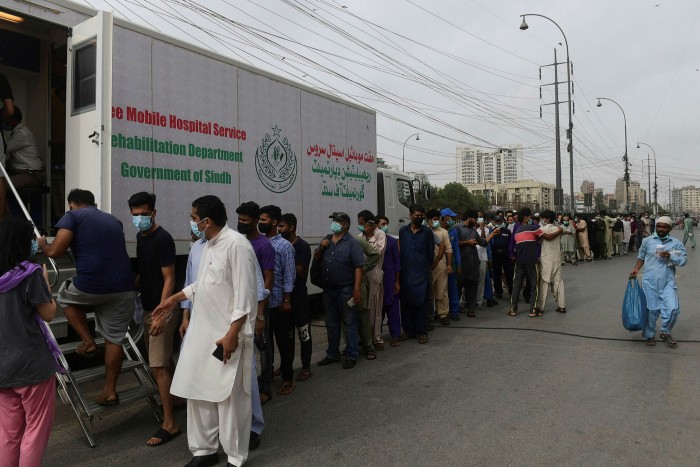Covid spurs expansion of public healthcare

Roula Khalaf, Editor of the FT, selects her favourite stories in this weekly newsletter.
From Delhi to Delaware, the Covid-19 pandemic has thrown a spotlight on the resources that governments, employers and patients have been willing, or able, to dedicate to diagnosing and treating disease.
Now, many people working in global health believe the wrenching experiences of the past 18 months can prove a catalyst for changes in the way healthcare is funded and organised, to ensure systems are more resilient to a future health emergency.
Rob Yates, head of the Centre on Global Health Security at Chatham House, the London-based think-tank, believes the coronavirus shock can stand alongside other watershed moments that have galvanised an expansion of public healthcare — the impact of the second world war on the creation of the British, French and Japanese health systems, for example, or the Sars epidemic in China.
Some on the political right, he says, might seize on the crisis to suggest an infusion of private money is needed, perhaps through the extension of private insurance. Yates argues, however, that the proven efficiencies of publicly funded systems make a strong case against such an approach.
He cites recent discussions in the UK over how best to raise the money needed to improve health and social care.
“All the debate in the UK is about how we find more public financing to pay for it . . . I don’t think anyone is saying that the solution to this is that we should be shaking down the population, with things like user fees or private health insurance,” Yates says. “Certainly, in the UK and in the OECD, all the discussions are around how you find more public finance.”
Even countries that have had a far greater tradition of private financing of healthcare over the years — such as the US, Ireland, Cyprus and South Africa — are now seeking to increase and improve publicly funded provision.
Yates also cites Pakistan, where prime minister Imran Khan “has said that he wants to launch a welfare state coming out of the Covid crisis, and top of his list is universal health coverage”.

Simon Bland, who has worked in international development for more than 35 years and now runs the Abu Dhabi-based Global Institute for Disease Elimination (Glide), argues that part of delivering a robust universal healthcare system may involve changes to the way in which scarce resources are allocated.
He recommends a less siloed approach that might, for example, involve reducing the focus on a single disease, such as malaria, in recognition that other tropical diseases present similar challenges.
“So, when we think about malaria and lymphatic filariasis, for example, it’s the same vector, it’s the same mosquito,” Bland notes. “So, clearly, there must be ways in which we can synchronise supply chains, use similar workforces, work in communities in a more choreographed and co-ordinated way.”
He acknowledges that funders often prefer programmes focused on a defined disease or outcome where the return on investment in terms of lives saved may be easier to demonstrate. But he argues this mindset should change.
Only about 20 per cent of funding, he says, is devoted to investment in research and development of new diagnostics and therapies — “things that could be a global public good. And I think we need a rebalancing, I think we need to have a lot more investment in global public goods [such as] those.”
More stories from this report
Covid raises bar for infectious disease crisis response
HIV treatments advance but vaccine remains ‘a long way off’
Governments fall behind in race to stem antimicrobial resistance
Covid provides fresh impetus to tackle global obesity
Long Covid researchers work ‘round the clock’ to solve the puzzle
How data can help prepare us for the next pandemic
Controversial virus research sparks political debate in US
Budget cuts hinder efforts to eliminate neglected tropical diseases
It is not just the developing world where arguments about universal healthcare may have been given further impetus by the pandemic.
Ezekiel Emanuel, an oncologist and bioethicist who is vice-provost for Global Initiatives at the University of Pennsylvania, suggests that the Affordable Care Act — which significantly widened eligibility for healthcare under President Barack Obama — meant attitudes were changing even before the pandemic struck. Even in conservative Republican states, ballot initiatives to expand Medicaid, the insurance system for poorer Americans, “have universally passed”.
“Now that tells you it’s not just Democrats who view health coverage as something of a right or something that everyone should get by dint of being in a civilised wealthy country,” Emanuel argues. “And I think that those ballots constitute evidence that attitudes have substantially changed in the country.”
In developed and developing nations alike, a primary lesson of the pandemic — that no one is protected until all are protected — is likely to influence all future debates on universal healthcare.
At Glide, Bland suggests the crisis has underlined “the interplay between communicable and non-communicable diseases . . . Those who are immunosuppressed or may have chronic ailments are at a higher risk of suffering severe disease through Covid.”
Transcending divisions between rich and poor countries, the pandemic has “thrown us all together, dealing with this same double burden”, he says.
The question now, Bland suggests, is the extent to which this will change behaviour, encourage more investment “and how far that will stimulate an understanding that universal healthcare is in everyone’s best interest rather than just [being] something we need to do to help others”.
“I’m not yet convinced [it will] — I’m hopeful but I’m not yet convinced,” he adds.
Comments